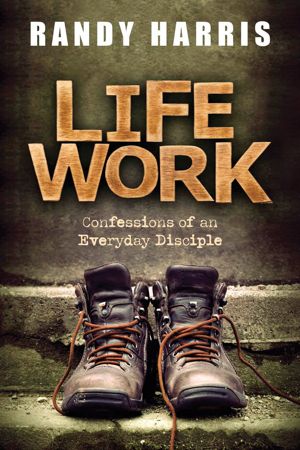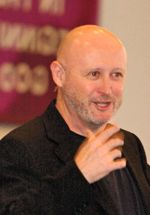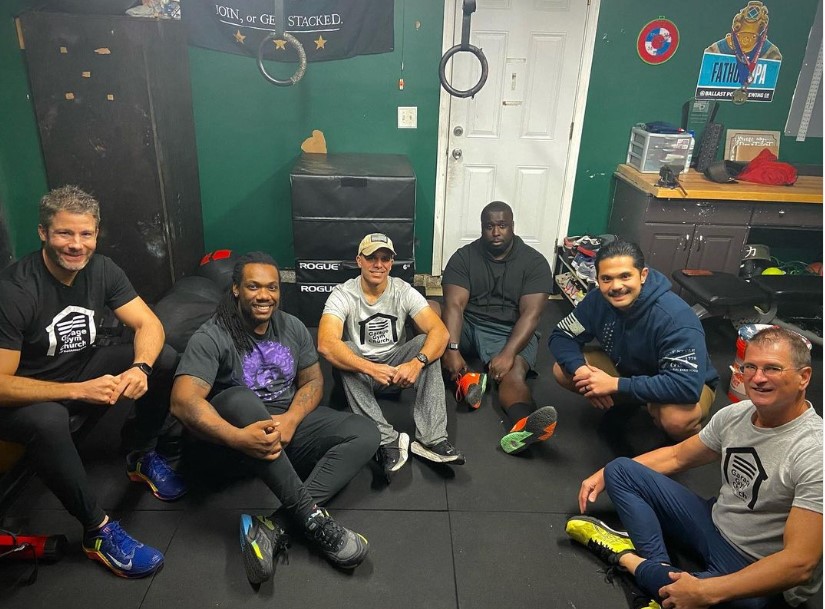 Excerpts from Life Work – Confessions of an Everyday Disciple copyright 2014 by Randy Harris. Used by permission of Leafwood Publishers, an imprint of Abilene Christian University Press.
Excerpts from Life Work – Confessions of an Everyday Disciple copyright 2014 by Randy Harris. Used by permission of Leafwood Publishers, an imprint of Abilene Christian University Press.
We have all seen it. You’ve maybe even done it a ‘few’ times. Textercising is texting while exercising or should I say texting INSTEAD of exercising. Even though you’re in your workout clothes and in the gym, that mobile phone distraction is keeping you from doing a good workout. It keeps you from a lot more too.
I use the terms “Facebook Fitness” and “Fundamental Fitness” as the extreme ends on a scale you can use to measure how well you are pursuing God in your social wellness. We all have a social life. Are your social interactions with others passive and distracted or intentional and engaged? Do you just LIKE others or are you able to truly LISTEN to them?
Your physical fitness is affected by how well you exercise your social life. Many of us need a “total lifestyle transformation”. However, after you have achieved the transformation that is where the work really begins. Randy Harris is a professor of theology and ethics. In talking about following Jesus Christ’s example for living he says, “Taking up the cross is a tall order. It can’t be done by just trying harder.”
 In his book, Life Work – Confessions of an Everyday Disciple he devotes a chapter to helping you understand how the fully mature Christian is not distracted. When you bring faith and fitness together you are pursuing both physical and spiritual maturity. The following excerpts from his book discuss how removing distractions are critical to maturity.
In his book, Life Work – Confessions of an Everyday Disciple he devotes a chapter to helping you understand how the fully mature Christian is not distracted. When you bring faith and fitness together you are pursuing both physical and spiritual maturity. The following excerpts from his book discuss how removing distractions are critical to maturity.
We need to face reality regarding the Bible. It is a sign of maturity to start with what’s there rather than start with my ideas of what ought to be there. We don’t just remember stuff, we create it. We wind up telling a different story than what’s really there because somehow we have trouble dealing with reality. We have a hard time sharing reality with one another. You could call it lying. I think we would prefer to call it something like finessing.
Distraction is the single greatest threat to our spiritual lives. We are the most distracted group of people in the history of civilization. People have always been distractible, but they haven’t always made it a way of life or an art form. A great leap toward Christian maturity is becoming less distracted.
Distracted people cannot pay attention to God in the way that they should. Whether we are perceiving, seeing, hearing, and understanding God is not going to be so much dependent upon whether God is doing anything as on whether we’re paying attention or not.
Distracted people cannot attend to God. The problem is not how much information we have; the problem is being able to discern it, to use it, to make sense of it, to sort it out. Distracted people have poor discernment, especially in the spiritual realm. One reason why we are continually making spiritual decisions that do not correspond to reality is because we are too distracted to discern.
The single most important source of unhappiness is the failure to be present to whatever one is doing at the time. Technology is affecting the way we deal with the world. We shouldn’t be entering into it uncritically. How can we learn to be more present to the people in front of us and to God?
Jesus is fully God and that means when I want to know about God, one of the primary places I look at is at Jesus. Jesus is fully human and that means when I want to know how to do human right, Jesus is the expert. Jesus’ sinlessness is a reflection of the fact that he is so attentive to God, that he is so in tune with God. That is the model for us. What I want to do is to get so in tune with God, be so attentive to God, be so non-distracted and in sync with God, that when I act, I always act out of the Spirit of God within me. When we do that life gets much better. Jesus is fully in touch with reality. He’s got reality right.
This grows out of Jesus’ prayer life. Jesus is so constantly in touch with God that as he walks through life he thinks God’s thoughts after him. This is more possible for you than you think. This sense is not magic. It’s maturity. It’s being attentive to God over long periods of time so that you start to see the world through God’s eyes. Trust your prayer. Trust the Holy Spirit in you to tell you when to speak and when to shut up. It’s that simple.
The plain fact of the matter is we haven’t made the sort of commitment to prayer that you have to make to actually experience that as a reality. So in all those situations we are constantly strategizing, and because we are so disconnected from reality and so distracted, our strategizing will often lead us astray.
What if you could be totally connected to reality and be so attentive to God that you could actually discern what God was doing in the world? Then you could actually join God in what he’s doing in the world.
Maturity is not so much measured by a set of religious behaviors, but rather by how in tune with God we are. In such a place we could act in far more redemptive ways in the world.

Textercising interrupts your workout and serves as a substitute to genuine face-to-face social interaction. Resist being distracted and instead connect with your present reality to connect with God and be used by Him.
Bringing this instruction full circle means to understand that physical fitness, a healthier body, an attractive physique, strong muscles and a confident attitude are vain and useless (in fact creating separation between you and God) if you are not giving them to God to be used by Him for His purpose to help others. Furthermore, liking someone or what he or she has to say is not the same as freeing yourself from distractions, taking time to personally listen with discernment, then pray for him or her.
Exercise your social life and faithfully be the life of Christ to others.
Brad Bloom, Publisher
 RANDY HARRIS is a popular speaker at conferences, churches, and college campuses across the United States and around the world. He is a professor of theology and ethics at Abilene Christian University in Abilene, Texas, and has received numerous awards for his classroom work. He holds degrees from Harding School of Theology and Syracuse University, and is the author of God Work: Confessions of a Stand-up Theologian (2009), Soul Work: Confessions of a Part-Time Monk (2011), and other books.
RANDY HARRIS is a popular speaker at conferences, churches, and college campuses across the United States and around the world. He is a professor of theology and ethics at Abilene Christian University in Abilene, Texas, and has received numerous awards for his classroom work. He holds degrees from Harding School of Theology and Syracuse University, and is the author of God Work: Confessions of a Stand-up Theologian (2009), Soul Work: Confessions of a Part-Time Monk (2011), and other books.













